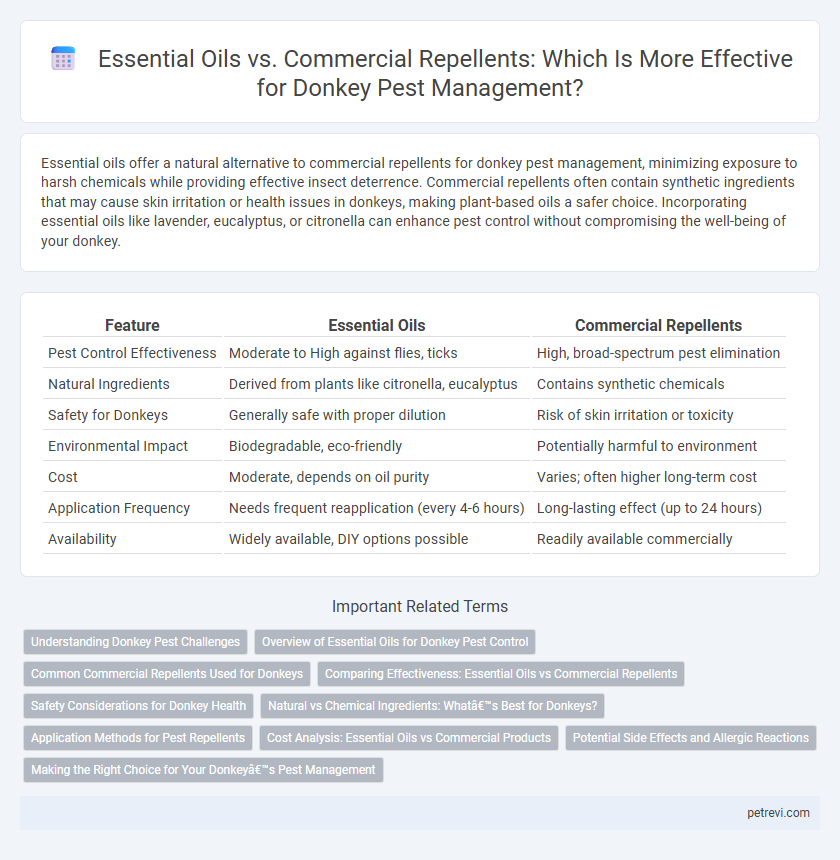Essential oils offer a natural alternative to commercial repellents for donkey pest management, minimizing exposure to harsh chemicals while providing effective insect deterrence. Commercial repellents often contain synthetic ingredients that may cause skin irritation or health issues in donkeys, making plant-based oils a safer choice. Incorporating essential oils like lavender, eucalyptus, or citronella can enhance pest control without compromising the well-being of your donkey.
Table of Comparison
| Feature | Essential Oils | Commercial Repellents |
|---|---|---|
| Pest Control Effectiveness | Moderate to High against flies, ticks | High, broad-spectrum pest elimination |
| Natural Ingredients | Derived from plants like citronella, eucalyptus | Contains synthetic chemicals |
| Safety for Donkeys | Generally safe with proper dilution | Risk of skin irritation or toxicity |
| Environmental Impact | Biodegradable, eco-friendly | Potentially harmful to environment |
| Cost | Moderate, depends on oil purity | Varies; often higher long-term cost |
| Application Frequency | Needs frequent reapplication (every 4-6 hours) | Long-lasting effect (up to 24 hours) |
| Availability | Widely available, DIY options possible | Readily available commercially |
Understanding Donkey Pest Challenges
Donkeys face significant pest challenges, including ticks, flies, and mosquitoes, which impact their health and productivity. Essential oils such as eucalyptus, citronella, and neem offer natural repellant properties that reduce pest irritation without harmful chemicals. Commercial repellents, while effective, often contain synthetic ingredients that may cause skin reactions or environmental concerns in donkey habitats.
Overview of Essential Oils for Donkey Pest Control
Essential oils such as citronella, eucalyptus, and tea tree oil provide natural insect-repellent properties that effectively reduce flies, ticks, and mosquitoes on donkeys. These oils contain bioactive compounds that disrupt the sensory receptors of pests, offering a safer alternative to synthetic chemicals commonly found in commercial repellents. Applying essential oils in diluted forms helps minimize skin irritation while promoting eco-friendly and sustainable pest management practices for donkeys.
Common Commercial Repellents Used for Donkeys
Common commercial repellents for donkeys typically include pyrethroid-based sprays, permethrin solutions, and insecticidal shampoos specifically formulated for equines. These products are widely used due to their proven efficacy against flies, ticks, and other pests that cause irritation and transmit diseases. Many commercial repellents also incorporate synergists like piperonyl butoxide to enhance insecticide performance and provide longer-lasting protection.
Comparing Effectiveness: Essential Oils vs Commercial Repellents
Essential oils such as citronella, eucalyptus, and lavender exhibit natural pest-repelling properties beneficial for donkey pest management but often require frequent reapplication due to their volatility. Commercial repellents typically contain synthetic chemicals like DEET or permethrin, offering longer-lasting protection against biting flies, ticks, and mosquitoes. Studies indicate commercial repellents generally provide more sustained efficacy, though essential oils are favored for their lower toxicity and reduced environmental impact.
Safety Considerations for Donkey Health
Essential oils like eucalyptus and citronella offer a natural alternative to commercial repellents, often containing fewer synthetic chemicals that can irritate donkey skin and respiratory systems. Commercial repellents frequently include DEET or pyrethroids, which may pose risks of toxicity or allergic reactions in donkeys with sensitive integument. Prioritizing safety, essential oils should be diluted appropriately and tested in small areas to prevent adverse effects while ensuring effective pest management for donkey health.
Natural vs Chemical Ingredients: What’s Best for Donkeys?
Essential oils such as citronella, eucalyptus, and lavender offer natural pest-repelling properties without the harsh chemicals found in commercial repellents, reducing the risk of skin irritation and respiratory issues in donkeys. Chemical repellents often contain DEET or pyrethroids that can provide longer-lasting protection but may pose toxicity concerns, especially for sensitive equine species. Selecting natural essential oils balances effective pest management with the health and comfort of donkeys, promoting a safer approach to preventing biting insects.
Application Methods for Pest Repellents
Essential oils for donkey pest management are typically applied through topical sprays or diluted rubs, ensuring direct contact with the animal's skin to maximize repellent effectiveness while minimizing irritation. Commercial repellents often come in ready-to-use sprays or pour-on formulations designed for quick application and long-lasting protection against flies, ticks, and other pests. Proper application methods are crucial for optimizing pest deterrence and maintaining donkey health, emphasizing the need for even coverage and adherence to recommended usage guidelines.
Cost Analysis: Essential Oils vs Commercial Products
Essential oils for donkey pest management typically offer a more cost-effective solution compared to commercial repellents, with prices ranging from $10 to $30 per bottle depending on concentration and type, versus commercial products costing between $20 to $50 per application. The recurring expense of essential oils is lower due to their concentrated nature, requiring smaller amounts per use, whereas commercial repellents often demand frequent reapplication, increasing overall expenditure. Cost analysis demonstrates that essential oils provide a budget-friendly alternative with the added benefit of natural ingredients, reducing long-term financial burden for donkey owners.
Potential Side Effects and Allergic Reactions
Essential oils such as eucalyptus and citronella can offer a natural alternative for donkey pest management but may cause skin irritation and allergic reactions in sensitive animals. Commercial repellents often contain synthetic chemicals like DEET, which may provide longer-lasting protection but carry higher risks of toxicity and respiratory issues in donkeys. Careful patch testing and consultation with a veterinarian are essential to avoid adverse side effects when selecting an appropriate pest control method for donkeys.
Making the Right Choice for Your Donkey’s Pest Management
Essential oils such as citronella, eucalyptus, and lavender offer a natural alternative for donkey pest management, providing effective repellency against flies and ticks without harsh chemicals. Commercial repellents often contain DEET or permethrin, which deliver potent protection but may cause skin irritation or toxicity in donkeys if misused. Choosing the right pest control involves assessing your donkey's sensitivity, pest exposure, and environmental impact, favoring essential oils for organic care or commercial products for high pest pressure situations.
Essential Oils vs Commercial Repellents for Donkey Pest Management Infographic

 petrevi.com
petrevi.com